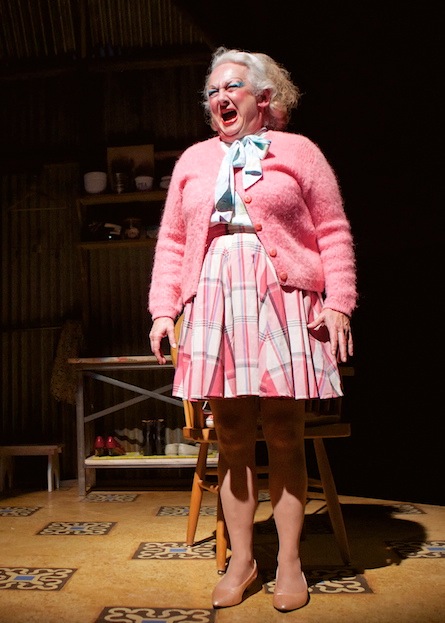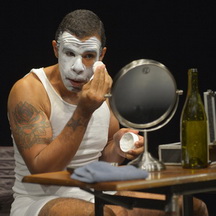A taut drama of wasted lives
Oh, those Irish playwrights! Oscar Wilde and George Bernard Shaw were agreeably genial blokes, but then along came Samuel Beckett with his bleak comedies about the meaninglessness of life, followed in the last few years by the likes of Martin McDonough, who gleefully rubs our noses in brutishness and blood, and Enda Walsh, whose trapped protagonists enact over and over again the humiliations of their pasts. Not that Walsh isn’t startlingly watchable, as The Walworth Farce, which visited Cal Performances a couple of years ago, demonstrated, and as The New Electric Ballroom, now at Shotgun Players, also shows.
At Ballroom you stare in pity and horror as a trio of women, who seem doomed to lonely exile from fulfillment, act out for us why joy will forever escape their grasp.
If this sounds bleak, it is, but Macbeth and Lear are bleak, too. Not that Enda Walsh is a Shakespeare–his creations are unknown and dispossessed souls rather than heros or clowns–but he has a talent for the wrenching poetry of the lost, and our hearts go out to them. They reflect the missed chances all of us lament in our humblest moments.
The New Electric Ballroom’s 90 uninterrupted minutes take place in a cottage in an isolated village on the Irish coast. Three women live there, two older sisters, Breda and Clara, and a third sister, younger by about twenty years, Ada. Ada works in a fishery, “turning fish into numbers,” as she says, and she’s painfully aware that the townsfolk look upon her clan as odd ducks. Everyone knows everyone’s business, and a fourth character, Patsy, who delivers fish, slams in the front door now and then to compulsively blurt the town’s latest gossip. He’s another lost soul–in a paranoid moment he claims the village is closing in on him–longing for some warmth of welcome from the sisters, though they repeatedly reject his forlorn advances. “Leave!” they command. Yet he’s a possible suitor for Ada. Can she find in him the fulfillment her older sisters missed?
Hope ended for Breda and Clara, and a troubled endurance began, at the Electric Ballroom decades ago, where each of the pair, young and full of hope, was rejected by a man; they dolled themselves up for a night on the town and got kicked in the teeth. Years later in their drab front room they dress up as they did then and, with the connivance of their younger sister, Ada, relive the humiliation in a pair of playlets, reveries of pain, which only they witness.
They do this over and over, week after week. Is it penance for daring to dream? Are they mad? Is it too late for Ada to get a man and a life, or will she, too, become an actor in her own drama of disappointment?
Shotgun Players gives this painful tale a tautly admirable production, guided with a sure hand by director Barbara Damashek, with the help of an artistic team that includes Valera Coble (costumes), Jim French (lighting), Matt Stines (sound), and a wonderfully down-at-heels set by the finest Bay Area practitioner of the art of set design, Eric Flatmo.
The actors who embody the drama mesh with a wonderful fluidity, each blending a distinct voice in a keening quartet: willowy Beth Wilmurt as tentative Ada, Trish Mulholland as needy Clara, Anne Darragh as fierce Breda, and Kevin Clarke as Patsy, whose monologues are highlights of the play.
When The New Electric Ballroom’s spell is over, you may find yourself wondering if its trapped-souls theme hasn’t been a little too predictably worked out; if, despite its admirable poetic qualities and many powerful moments, you haven’t met this grubby, doomed-to-unhappiness view of life a little too often, in Harold Pinter and others. Nonetheless while it plays out, Ballroom is mesmerizing. It occupies the Ashby Stage until October 5th, followed by the next in Shotgun Players’ 2014 season, Laurel Meade’s Harry Thaw Hates Everybody. For tickets/information call 841-6500 or visit www.shotgunplayers.org.
–ROBERT HALL
